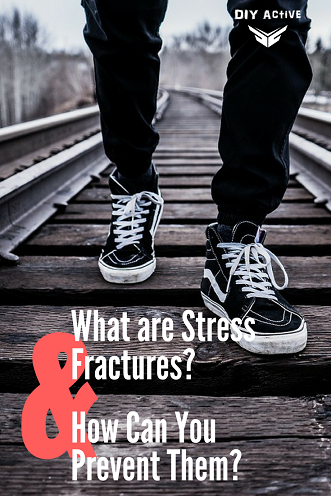Worried About Exercise and Stress Fractures?
We work so hard to lose weight or gain muscle mass, right? We don’t want to get derailed with stress fractures that put you on the sideline for months! Get the low down on stress fractures and how to prevent them!
So what exactly are stress fractures?
A stress fracture is a small crack that does not completely penetrate the bone.
While they’re most often associated with high-impact sports, people with conditions like osteoporosis are also at increased risk of forgetting them.
If you think you may be prone to getting stress fractures, there are some preventative measures you can take.
Wear Proper Shoes

Talk to a shoe store attendant about your needs before buying something that may not offer adequate protection.
Start Out Slowly
If you’re getting back into an exercise program after a long layoff, it’s best to start out slowly. Demanding more from your body than it has come to expect can easily result in a stress fracture. Avoid jumping right into the most extreme workouts until your body has had time to adapt, then gradually increase the level of intensity.
If you’re really out of shape, walking may be the best way to begin. Fisher & Talwar attorneys see many injuries and recommend talking to a professional about starting out a new exercise program.
Strengthen Your Bones
It may seem odd to encourage exercise when exercise itself can lead to stress fractures, but the idea is to strengthen your body over time. Weight-bearing exercise is particularly effective at helping build new bone tissue.
If you can’t afford a gym or personal trainer, start by walking, then jogging, and jumping rope. As your bones get stronger, you’ll be able to handle high-impact aerobics and running on a regular basis.
Strengthen Your Muscles
To avoid breaking any bones, you also need stronger muscles. An ideal way to get started is with bodyweight exercises like push-ups and squats. Your muscles will soon adapt by becoming stronger, making it easier to handle weight lifting and other forms of resistance training.
Be sure to alternate your daily workouts to avoid putting repeated stress on the same body parts.
Eat Healthy Foods
Exercise of any kind requires a strong foundation. If you’re not getting the nutrition you need for an active lifestyle, you’ll either give up from the soreness or eventually succumb to injury. Calcium is one of the most important minerals your body needs to keep your teeth and bones strong.
If you don’t get enough, what you do get will likely go into your bloodstream, instead of your bones. The calcium in your bones will soon become depleted, leaving them more prone to breaks and fractures. Your body also needs vitamin D to help it absorb calcium properly.
Although it is produced in the body, you have to get enough sunlight for this to occur. Otherwise, consider adding more dairy products, fish, eggs, mushrooms, and ham to your diet.
Consider Supplements
When you’re not getting enough nutritional support from your diet, supplementation is the next best solution. Just remember to discuss new supplements with your doctor first, especially if you have any questionable health problems.
Wrap-Up
The best weapon against stress fractures is prevention…
It’s up to you to pay attention to what your body is trying to tell you, especially if you’re experiencing pain, tenderness, or bruising.
Remember that you can do a lot to prevent stress fractures by wearing the right footwear, strengthening your body, and providing it with adequate nutrition.
- How to Get Into Shape Again After Winter - April 10, 2023
- Best Exercises for a Strong Spine - August 29, 2021
- 5 Ways to Reduce the Impact of Stress on Your Body - June 16, 2020